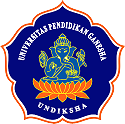Pengembangan Perangkat Layanan Bimbingan Klasikal untuk Meningkatkan Kemandirian Belajar Siswa
DOI:
https://doi.org/10.23887/jurnal_bk.v7i1.1206Keywords:
bimbingan klasikal, kemandirian siswa, research & developmentAbstract
This research is a research & development research. The product developed is the Classical Guidance Service Tool to improve Students' Independent Learning. The development in this study uses a 4D model. The subjects of this study were 3 Counseling Guidance Lecturers and 2 Counseling Guidance Teachers at SMP. The data collection method in this study was using a questionnaire. The acceptance of the classical guidance service apparatus found that the results of the CVR index calculation showed that the total total score was 45, so that the CVI calculation obtained the result 1. The results of the t-test data in the table, the probability value or Sig. (2-tailed) is 0.000, the probability value is this is more than the 0.05 level of significance. Thus, it is effective to increase student learning independence, to test classical tutoring tools to increase student learning independence. The acceptance of the classical guidance service apparatus is a high or low assessment of the usefulness, accuracy, and accuracy of the apparatus which includes: RPL, service materials, media services, LKPD, and evaluation tools.
References
Akbar, P., Hamid, A., Bernard, M., & Sugandi, A. I. (2017). Analisis Kemampuan Pemecahan Masalah Dan Disposisi Matematik Siswa Kelas Xi SMA Putra Juang Dalam Materi Peluang. Jurnal Cendekia : Jurnal Pendidikan Matematika, 2(1), 144–153. https://doi.org/10.31004/cendekia.v2i1.62
Ansori, Y., & Herdiman, I. (2019). Pengaruh Kemandirian Belajar terhadap Kemampuan Pemecahan Masalah Matematis Siswa SMP. Journal of Medives : Journal of Mathematics Education IKIP Veteran Semarang, 3(1), 11. https://doi.org/10.31331/medivesveteran.v3i1.646
Effendi, E., Mursilah, M., & Mujiono, M. (2018). Korelasi Tingkat Perhatian Orang Tua dan Kemandirian Belajar dengan Prestasi Belajar Siswa. Titian Ilmu: Jurnal Ilmiah Multi Sciences, 10(1), 17–23. https://doi.org/10.30599/jti.v10i1.131
Hendikawati, P., Zahid, M. Z., & Arifudin, R. (2019). Android-Based Computer Assisted Instruction Development as a Learning Resource for Supporting Self-Regulated Learning. International Journal of Instruction, 12(3), 389–404. https://eric.ed.gov/?id=EJ1220203
Indah, R. P., & Farida, A. (2021). Pengaruh Kemandirian Belajar Siswa Terhadap Hasil Belajar Matematika. Jurnal Derivat: Jurnal Matematika Dan Pendidikan Matematika, 8(1), 41–47. https://doi.org/10.31316/j.derivat.v8i1.1641
Kamaluddin, H. (2011). Bimbingan dan Konseling Sekolah. Jurnal Pendidikan Dan Kebudayaan, 17(4), 447. https://doi.org/10.24832/jpnk.v17i4.40
Laksana, A. P., & Hadijah, H. S. (2019). Kemandirian belajar sebagai determinan hasil belajar siswa. Jurnal Pendidikan Manajemen Perkantoran, 4(1), 1. https://doi.org/10.17509/jpm.v4i1.14949
Lase, B. P. (2018). Posisi Dan Urgensi Bimbingan Konseling Dalam Praktik Pendidikan. Jurnal Warta, 58(1), 1–17. https://doi.org/10.46576/wdw.v0i58.392
Laswhe, H, C. (1975). A Quantitative Approach To Content Validity. Personnel Psychology, 28(563–578).
Lesmana, G. (2019). Penyusunan Perangkat Pelayanan Bimbingan dan Konseling (1st ed.). Medan: Kencana.
Nurhayati, E. (2017). Penerapan Scaffolding untuk Pencapaian Kemandirian Belajar Siswa. Jurnal Penelitian Pendidikan Dan Pengajaran Matematika, 3(1), 21–26. https://doi.org/10.37058/jp3m.v3i1.197
Pratiwi, I. D., & Laksmiwati, H. (2016). Kepercayaan Diri dan Kemandirian Belajar Pada Siswa SMA Negeri “X.” Jurnal Psikologi Teori Dan Terapan, 7(1), 43. https://doi.org/10.26740/jptt.v7n1.p43-49
Rahmayani, S. (2018). Meningkatkan Pemahaman Peran Gender Melalui Layanan Bimbingan Kelompok Pada Siswa Kelas VII SMP Muhammadiyah 05 Medan. Doctoral Dissertation.
Senja, V. U., & Purwoko, B. (2020). Perangkat Bimbingan Klasikal Bidang Pribadi & Sosial Berorientasi Higher Order Thinking Skill (Hots) Pada Siswa Kelas Viii Sekolah. Jurnal BK UNESA. https://jurnalmahasiswa.unesa.ac.id/index.php/jurnal-bk-unesa/article/view/35734
Sholihah, I. N., & Handayani, T. (2020). Pemanfaatan Powtoon Sebagai Media Bimbingan Klasikal Pada Pembelajaran Jarak Jauh (Pjj). PD ABKIN JATIM Open Journal, 50–58. https://ojs.abkinjatim.org/index.php/ojspdabkin/article/view/84
Syahputra, D. (2017). Pengaruh Kemandirian Belajar dan Bimbingan Belajar terhadap Kemampuan Memahami Jurnal Penyesuaian pada Siswa SMA Melati Perbauangan. At-Tawassuth, 2(2), 368–388. https://doi.org/10.30821/ajei.v2i2.1227
Syelitiar, F., & Putra, A. (2021). Systematic Literatur Review: Kemandirian Belajar Siswa Pada Pembelajaran Daring. Sepren, 2(2), 23–31. https://doi.org/10.36655/sepren.v2i2.490
Thiagarajan. (1974). Instructional Development for Training Teachers of Exceptional Children A Sourcebo. Indiana University Bloomington.
Wiriani, W. T. (2021). Pengaruh Kemandirian Belajar Terhadap Hasil Belajar Siswa Pada Pembelajaran Online. Jurnal Ilmiah Matematika Realistik, 2(1), 57–63. https://doi.org/10.33365/ji-mr.v2i1.436
Yuliastini, N. K. S., Dharma Tari, I. D. A. E. P., Putra Giri, P. A. S., & Dartiningsih, M. W. (2020). Penerapan Media Bimbingan Konseling untuk Meningkatkan Keterampilan Guru BK dalam Memberikan Layanan Pendidikan Seks terhadap Peserta Didik. International Journal of Community Service Learning, 4(2). https://doi.org/10.23887/ijcsl.v4i2.25055





